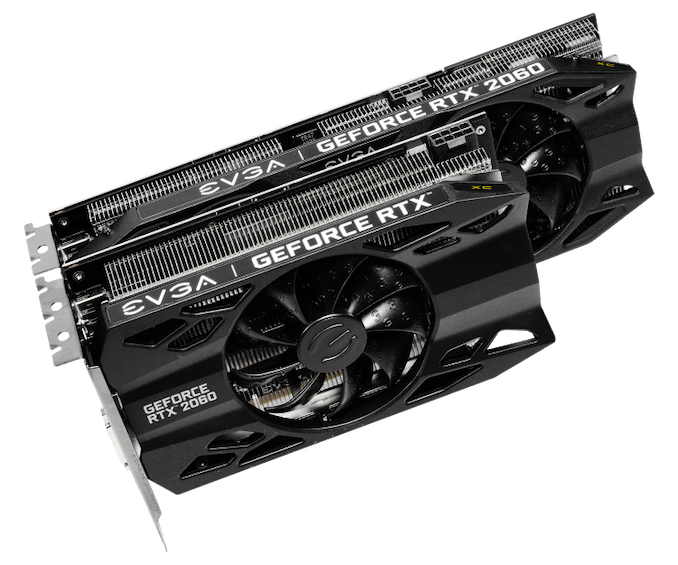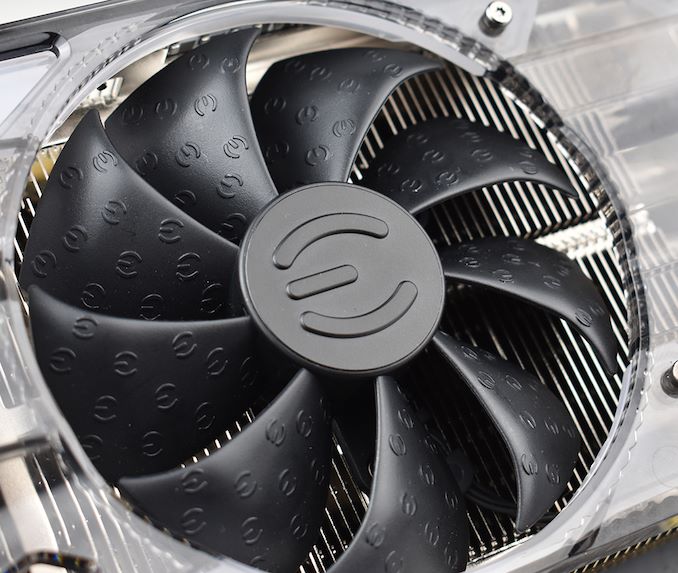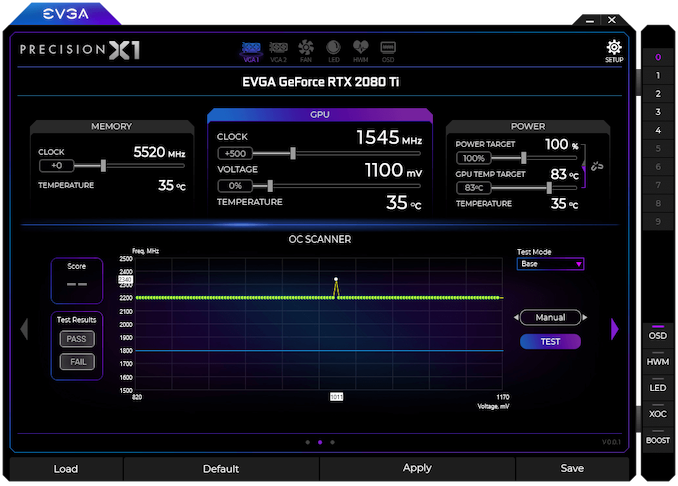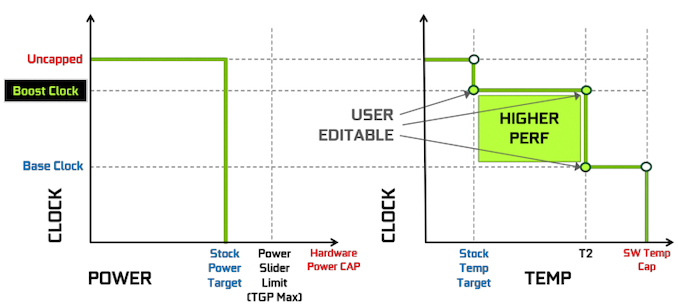The NVIDIA GeForce GTX 1660 Review, Feat. EVGA XC GAMING: Turing Stakes Its Claim at $219
by Ryan Smith & Nate Oh on March 14, 2019 9:01 AM ESTMeet The EVGA GeForce GTX 1660 XC Black GAMING
Like last month's GeForce GTX 1660 Ti, the GeForce GTX 1660 is also a pure virtual launch, meaning it doesn't bring any Founders Edition models and leaves everything to NVIDIA’s add-in board partners. For today's reviewer, we're look at EVGA’s GeForce GTX 1660 XC Black, a 2.75-slot single-fan card with reference clocks and a slightly increased TDP of 130W. And this should all sound a little familiar; it's the same cooling design as the EVGA GeForce GTX 1660 Ti XC Black that we took a look at last month.
| GeForce GTX 1660 Card Comparison | ||||
| GTX 1660 (Reference Specification) |
EVGA GTX 1660 XC Black GAMING | |||
| Base Clock | 1530MHz | 1530MHz | ||
| Boost Clock | 1785MHz | 1785MHz | ||
| Memory Clock | 8Gbps GDDR5 | 8Gbps GDDR5 | ||
| VRAM | 6GB | 6GB | ||
| TDP | 120W | 130W | ||
| Length | N/A | 7.48" | ||
| Width | N/A | 2.75-Slot | ||
| Cooler Type | N/A | Open Air | ||
| Price | $219 | $219 | ||
To that end, there is nothing new about the design that we didn't cover last time. Utilizing technology and features first introduced with earlier RTX 20-series, the "XC" branded GTX 1660 incorporates aspects of EVGA's new iCX2 cooling design. For one, EVGA reworked their cooler design with hydraulic dynamic bearing (HDB) fans, offering lower noise and higher lifespan than sleeve and ball bearing types, and this is present in the EVGA GTX 1660 XC Black.
Like some of its older EVGA siblings, the GTX 1660 XC Black is a squat single-fan solution, complementing a longer and skinnier dual-fan version. Being so 'stubby', the one-fan GTX 1660 XC Black wields a triple-slot bracket and essentially occupies three slots due to the thick heatsink and correspondingly taller fan hub. The advantage of being so short, though, is suitability for mini-ITX form factors.
And unsurprisingly, considering that the GTX 1660 Ti XC Black lacked this feature, the GTX 1660 XC Black does not feature LEDs and zero-dB fan capability, where fans turn off completely at low idle temperatures. The former is an eternal matter of taste, as opposed to the practicality of the latter, but both tend to be perks of premium models and/or higher-end GPUs.
The output situation also holds no surprises, though partners ultimately can opt for what they'd like here. The GTX 1660 XC Black goes for a standard mainstream card configuration with 1x DisplayPort/1x HDMI/1x DVI and not including a USB-C/VirtualLink output. Although the TU116 GPU still supports VirtualLink, the decision to implement it is up to partners; the feature is less applicable for cards further down the stack, where cards are more sensitive to cost and are less likely to be used for VR. Additionally, the 30W USB-C controller power budget could be significant amount relative to the overall TDP.
And on the topic of power, the GTX 1660 XC Black’s power limit is capped at the default 130W like the GTX 1660 Ti XC Black, though theoretically the card’s single 8-pin PCIe power connector could supply 150W on its own.
The rest of the other GPU-tweaking knobs are there for your overclocking needs, and for EVGA this goes hand-in-hand with Precision, their overclocking utility. For NVIDIA’s Turing cards, EVGA released Precision X1, which allows modifying the voltage-frequency curve and scanning for auto-overclocking as part of Turing’s GPU Boost 4. Of course, NVIDIA’s restriction of actual overvolting is still in place, and for Turing there is a cap at 1.068v.
A final note is EVGA's new 'Associates' referral/rewards program, which launched just this month. EVGA Elite members can offer referral codes, which will provide the buyer a discount, and the referring member a 3-5% cut in the form of EVGA Bucks.

















77 Comments
View All Comments
Opencg - Thursday, March 14, 2019 - link
honestly the selling point is the interface and things like high frame rate, high quality vr, a more customizable experience (sometimes this means fixing things that should just work though). playing everything at 180fps is a bit different than console. as well its up to personal preference whether you prefer a mouse or controller. many games on pc support both. all in all its a bit more involved and alot more expensive. and the game libraries are slightly different but i would say there are for sure enough games for pc.eva02langley - Thursday, March 14, 2019 - link
With PS5 coming in next year at 500$ with 4k@60Hz and Freesynch, I would not even bother.If you already have a desktop and want to upgrade, then yeah, makes sense.
PeachNCream - Thursday, March 14, 2019 - link
I wasn't aware there was a PS5 on the horizon. Makes sense though given the amount of time current consoles have been on the market. That does end up making the decision. There's no point in building a desktop that'll be made obsolete by the next console generation as I'd have to go from ground up. I'm not playing that buy stuff and then within a year have to buy more stuff just to get passable FPS game. It's annoying so I'll just hunker down and wait to get a new console.Bp_968 - Thursday, March 14, 2019 - link
There really isn't much comparison. A console is designed for 30-60fps gaming, a controller and not a KB/M, and has zero modding culture and a much smaller game selection (RTSs are almost nonexistent for example). Heck, PC just got a free skyrim total conversion released that many people think is *better* than skyrim itself!As for "made obsolete in no time" thats not the way it works anymore. Modern consoles are budget PCs with custom software installed. They use mostly off the shelf CPUs and GPUs now instead of the custom ASICs they used in the past. This means a decent PC build will likely outperform a console for the entire console generation or more (my i7 960 was still outperforming the PS4PRO, and only the xbox1x was faster and by then the PC was 7 years old). I upgraded to a 8700k with a 1070ti (350$ for the card at the time) and it will likely still outperform the next generation of consoles since all speculation has them locking in their hardware design using AMDs 2nd gen ryzen cpu design and vega gpu design.
Nvidias current and last gen cards will easily outperform the most likely upcoming consoles and AMDs ryzen 3rd gen and intels last two gens will easily outperform them as well.
If you only care about playing the latest AAA titles (COD, BF, rockstar stuff, etc) than a console is probably fine. Personally I prefer the much broader game selection, the near constant sales, the ability to share games with friends and family (steam), emulators, and the fact that I can still play, on my current PC, games I bought when the PS1 was new. I hope modern consoles maintain backwards compatibility this next gen, but they certainly don't have the wonderful granularity of upgrade path the PC has enjoyed for decades.
And last but not least, building and upgrading a gaming PC has gotten so easy even totally computer illiterate gamers can do it. Its a 1 or 2 hour plug and play "lego" affair at this point. That alone amazes me, especially when I think back to how involved the process was in the 90s (back before PCI made life so much easier).
eva02langley - Thursday, March 14, 2019 - link
You really think I am going to read that?Look, building a ground up PC with a 1660, as of now, is not better than buying a PS4 Pro. Microsoft and Sony are aiming for 4k @ 60 Htz, that's a given. One year from now, I totally believe 500$ PS5 will be able to democratize 4k.
PeachNCream - Friday, March 15, 2019 - link
Yeah, I'm gonna say TL;DR as well.D. Lister - Saturday, March 16, 2019 - link
@Bp_968As someone who does NOT have ADD, I did actually read what you said, and you have made some good points. To suggest that getting a console somehow gets you a better deal is so early 2000's it's not even funny.
Rainmaker91 - Sunday, March 17, 2019 - link
Look, while you do make some good points here you are a bit off on some other points.Console markets have always had custom hardware, and that includes the Xbox one and the PS4 as well. Current generation consoles are based on jaguar and Polaris cores, but don't think for a second that they are not custom solutions. Another thing to keep in mind is that consoles has a tendency of using cutting edge architectures, as in not this generation, but the next one (the Xbox 360 GPU is a good example here being a hybrid design somewhere between the x1950 and the hd2900). So the ps5 is unlikely to use zen+ with Vega 7nm as you suggested, but far more likely to utilize zen2 and Navi as the basis. Which is also what all the rumors have indicated.
I prefer computers to, but arguing that consoles=pc just because it's x86-64 based is just not true. Consoles will also no doubt be better value at their price point at launch, but they do lack any upgradability options. So going from a console to a pc if you don't already have one makes little sense if the budget is 500 and you are not aiming for that games in the RTS genre for example.
Orange_Swan - Thursday, March 14, 2019 - link
yeah, I'm really not that convinced about that 4k60 PS5 rumor using the RTX 2060 review here, and using all games,the Vega 56 averages 40.9, the Vega 64 averages 47.5, the RTX 2060 averages 43.5, the GTX 1070 ti averages 43.3, the GTX 1080 averages 47.1. with an average of all the GPUs being 44.4fps
eva02langley - Thursday, March 14, 2019 - link
If you think Sony and Microsoft is not aiming at 4k@60Hz, then what would be the point of even a new console since we have that already.Also, console hardware is more efficient since it is dedicated for gaming only. Even with lower spec, you can achieve incredible result. Also, all games are develop on consoles first and botched as a PC port after nowadays. If you are a console person, as of now, unless you are putting down 700-800$ on a GPU, it will not get you any benefit... especially not a 1660 GTX.